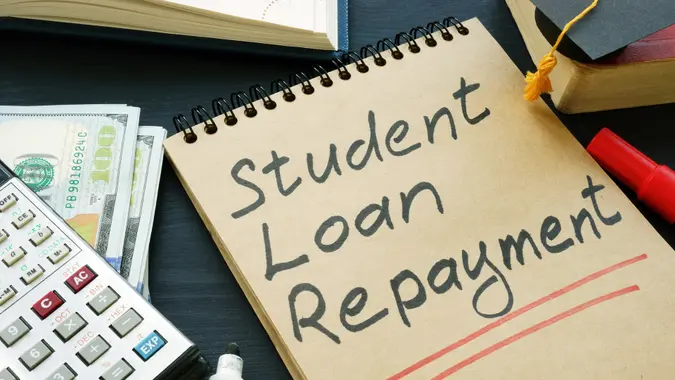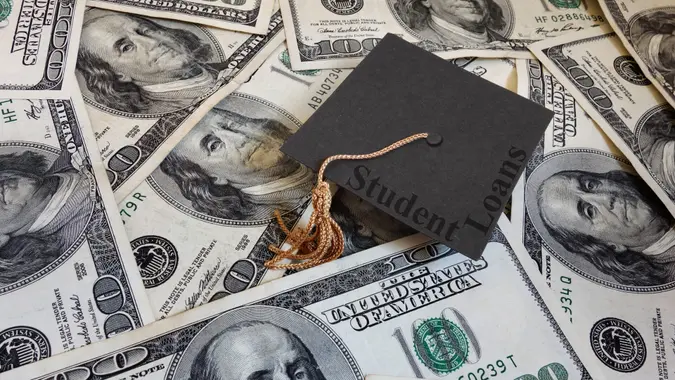Should You Use Your 401(k) To Pay Off Student Loans?

Commitment to Our Readers
GOBankingRates' editorial team is committed to bringing you unbiased reviews and information. We use data-driven methodologies to evaluate financial products and services - our reviews and ratings are not influenced by advertisers. You can read more about our editorial guidelines and our products and services review methodology.

20 Years
Helping You Live Richer

Reviewed
by Experts

Trusted by
Millions of Readers
The cost of obtaining a post-secondary education has skyrocketed over the past several decades. According to a report by CNBC, the average tuition and fees for a private nonprofit four-year college are nearly $40,000. Students are taking out more debt than ever to pay for this astronomical cost. As noted in the article, Americans now owe over $1.7 trillion for their education, and the prices are not going down.
On average, bachelor’s degree recipients graduate with nearly $30,000 of student loan debt. Monthly payments for these loans can range from $100 to $300 or more. For individuals holding master’s or doctoral degrees, payments can easily exceed $1,000 each month.
Undoubtedly, graduates are drowning in debt. Given these stark realities, the question becomes: Should you use your 401(k) to pay off your student loans?
Facing the Facts
Before withdrawing money from your 401(k), you need to know the facts. Unless you are of retirement age (59 ½), you likely will face a penalty for withdrawing from your 401(k). As noted by the Internal Revenue Service (IRS), early distributions from a retirement plan can result in a 10% penalty unless an exception applies. You also may have to pay income (state and federal, depending on where you live) on the amount you take.
If the weight of your student loans is crushing you, there may be several alternatives to consider before accepting the penalty and taxes associated with an early withdrawal from your 401(k). Therefore, unless you are at serious risk of defaulting or are at least 59 ½ years old, using your 401(k) to pay off your student loans is not a wise choice.
Exceptions To the Rule
As with everything in life, there are a few exceptions to consider. For instance, you may be eligible for a hardship withdrawal. A hardship distribution does not allow you to take out money to repay your student loans but can be used if you have an “immediate and heavy financial need.”
According to the IRS, tuition to cover your educational fees and room and board expenses meet the immediate and heavy financial need burden. You also can use a hardship distribution to cover post-secondary education costs for your spouse, children, dependents or beneficiaries.
Again, a hardship distribution cannot be used to pay student loan debt that you already have incurred, but it can be used to pay tuition for the upcoming 12 months. Also, some retirement plans do not allow hardship distributions.
Borrowing Might Be Better
If you are in a tight financial spot but have a healthy 401(k), you might want to consider taking a loan against your retirement plan. According to the IRS, individual retirement accounts (IRAs) and IRA-based plans are not able to offer loans.
To borrow against your 401(k), you must first ensure that your plan offers loans to participants. Then, make sure you read the fine print. There may be a minimum and maximum on how much you can borrow. Generally, you can receive a loan for up to 50% of your vested account balance, up to $50,000. Furthermore, in most cases, you will have to repay your loan within five years, meaning you could have higher payments.
Weigh Your Options
Long story short: Before you take the penalty, consider other options as opposed to withdrawing from your 401(k). Even if it is healthy, you will be doing yourself a disservice. Not only will you be paying a lot to take the money out, but you also will be losing out on potential earnings. You’ll be losing out on compounding interest that turns your modest sum into a large nest egg by the time you retire.
Consider the Alternatives
Now that you understand why withdrawing early from your 401(k) to pay for your student loans is not advisable, let’s discuss other avenues for paying your loans. Depending on the type of loan you have, you can ask for forbearance or forgiveness. State and federal programs may help you cancel the outstanding debt, mainly if you have chosen a career in public service.
If you have federal student loans that are high compared to your income, you may be eligible for an “income-driven repayment plan.” An income-driven repayment plan may reduce your student loan significantly.
You also can reach out directly to your lender to see whether it will work with you on payments. Explain why you need a deferment on your loans, and be prepared to back it up. If you took out a private loan with a high-interest rate, you could look at refinancing. All of these options may be preferable considering the short- and long-term negative impact of taking an early withdrawal from your 401(k).
 Written by
Written by  Edited by
Edited by 
























